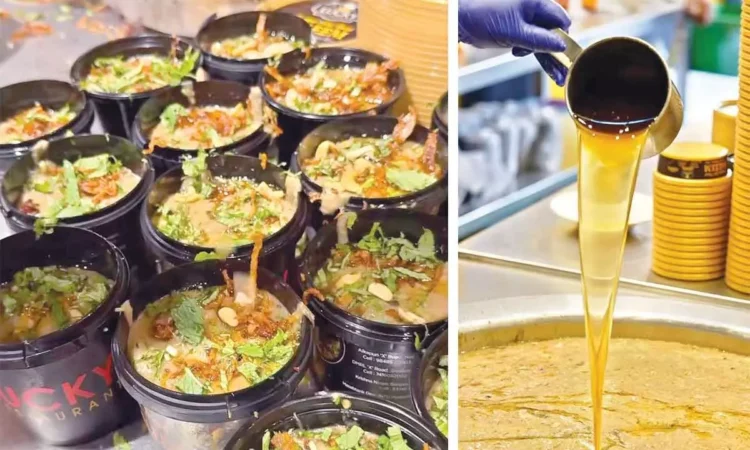Haleem, wah! Urban gourmands devoting their finances on savoring exquisite cuisine
The mouthwatering seasonal treat from Hyderabad Hoteliers’ arbitrary charges and lack of control over prices this season are causing haleem to escape the wallets of haleem enthusiasts in the city. The largest businesses of the season are sure that sales did not lag this year, despite predictions of a weak market for Haleem during Ramadan owing to excessive prices.

Restaurants in Ramzan are already filled with the delicious scent of haleem. Humans of all religions are passionate about Haleem. Owing to the high cost of haleem this season, aficionados of the food may have to part with a substantial portion of their cash despite the protein-dense lentils, pork, and bread topped with pure ghee. In the city’s hotels and restaurants, a bowl of haleem costs between Rs 250 and Rs 290 per plate, while a special plate costs between Rs 320 and Rs 360. Hoteliers assert that the increased cost of the components needed to prepare this delicious meal is what caused this spike.
A lover of haleem, Murtuza Mohsin, said, “Hoteliers are raising the cost of haleem with every year that goes by. Their sales did not, however, lag. It’s becoming more and more expensive every year, which makes it more difficult for consumers. The speaker suggested that standard pricing be established by the government or hotel organizations to promote equity for both lodging providers and patrons who are in search of delicious food. It has been noted that the cost of the delicacy is at least Rs 12,000 if one is traveling with a buddy or a family of four.
Pista House, Hotel Shadab, Shah Ghouse, Café 555, Sarvi, Mandaar, Café Bahar, Grand Hotel, Subhan Bakery, Paradise, Peshawar, Nayaab Hotel, and Grill 9 are among the well-known restaurant chains that sell haleem in large quantities. The delicacy is priced between Rs 250 and Rs 290 for 350 grams.
The hotelier asserts, however, that this year’s price increases are the result of rising labor costs, packaging, and the cost of necessities. The proprietor of the Lucky Group of restaurants, Syed Ali Raza Kazmi, notes that the cost of basic components like mutton, dal, wheat, pure ghee, dried fruits, saffron, and other items used to make haleem has increased significantly. In addition to this, the cost of plastic containers has increased. However, the Lucky Hotel has chosen to offer a value pack of 160 gms for Rs 150 and a 350 gm Haleem for Rs 230 in its network of restaurants in order to make the Haleem more affordable.
Ali Raza declared: “The wholesale price of mutton, which was Rs 600 before cutting and waste, is now Rs 720. Additionally, there was a rise in the cost of dals, such as urad and moong dal. It costs Rs 600 for pure ghee, which is necessary for Haleem, where more than 15 kilograms is required in one dish. Every component required to make haleem has increased.”
Ali Raza also made the crucial observation that labor costs have gone up since the COVID shutdown. Labor costs, which used to range from Rs 8,000 to Rs 10,000, have now seasonally increased to Rs 15,000. The majority of hotel owners also provide them with lodging and food.
He said, “This year, Ustad’s (the person who prepares haleem) fee has almost doubled. The Ustadteam used to charge between Rs 45,000 and Rs 50,000, but this Haleem season, prices range up to Rs 75,000 and more, depending on the hotel, according to Ali Raza.
Additionally, it has been noted that several hotels have started offering a value pack of 160 grams of haleem due to the rise in pricing. This retails for Rs 160, with some selling for Rs 150.
“Value-packaged haleem has become more popular among haleem enthusiasts this year, which has resulted in higher sales. Value pack Haleem is becoming popular even among those on tight budgets, according to a Hotel Shabad management representative.







